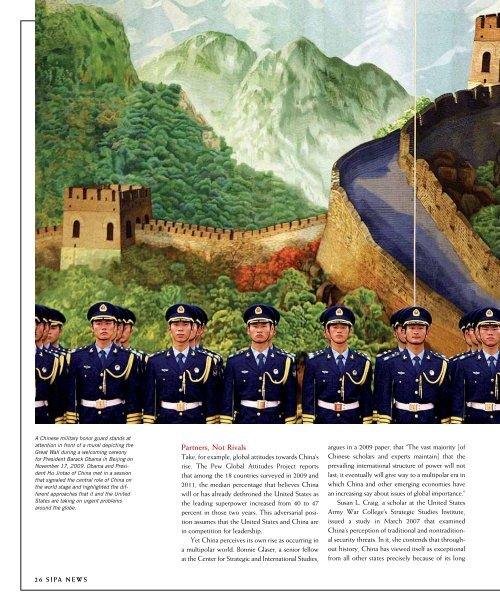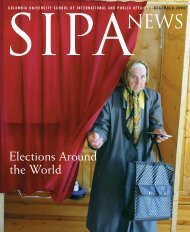SIPANewS - School of International and Public Affairs - Columbia ...
SIPANewS - School of International and Public Affairs - Columbia ...
SIPANewS - School of International and Public Affairs - Columbia ...
Create successful ePaper yourself
Turn your PDF publications into a flip-book with our unique Google optimized e-Paper software.
A Chinese military honor guard st<strong>and</strong>s at<br />
attention in front <strong>of</strong> a mural depicting the<br />
Great Wall during a welcoming cereony<br />
for President Barack Obama in Beijing on<br />
November 17, 2009. Obama <strong>and</strong> President<br />
Hu Jintao <strong>of</strong> China met in a session<br />
that signaled the central role <strong>of</strong> China on<br />
the world stage <strong>and</strong> highlighted the different<br />
approaches that it <strong>and</strong> the United<br />
States are taking on urgent problems<br />
around the globe.<br />
Partners, Not Rivals<br />
Take, for example, global attitudes towards China’s<br />
rise. The Pew Global Attitudes Project reports<br />
that among the 18 countries surveyed in 2009 <strong>and</strong><br />
2011, the median percentage that believes China<br />
will or has already dethroned the United States as<br />
the leading superpower increased from 40 to 47<br />
percent in those two years. This adversarial position<br />
assumes that the United States <strong>and</strong> China are<br />
in competition for leadership.<br />
Yet China perceives its own rise as occurring in<br />
a multipolar world. Bonnie Glaser, a senior fellow<br />
at the Center for Strategic <strong>and</strong> <strong>International</strong> Studies,<br />
argues in a 2009 paper, that “The vast majority [<strong>of</strong><br />
Chinese scholars <strong>and</strong> experts maintain] that the<br />
prevailing international structure <strong>of</strong> power will not<br />
last; it eventually will give way to a multipolar era in<br />
which China <strong>and</strong> other emerging economies have<br />
an increasing say about issues <strong>of</strong> global importance.”<br />
Susan L. Craig, a scholar at the United States<br />
Army War College’s Strategic Studies Institute,<br />
issued a study in March 2007 that examined<br />
China’s perception <strong>of</strong> traditional <strong>and</strong> nontraditional<br />
security threats. In it, she contends that throughout<br />
history, China has viewed itself as exceptional<br />
from all other states precisely because <strong>of</strong> its long<br />
26 SIPA NEWS

















